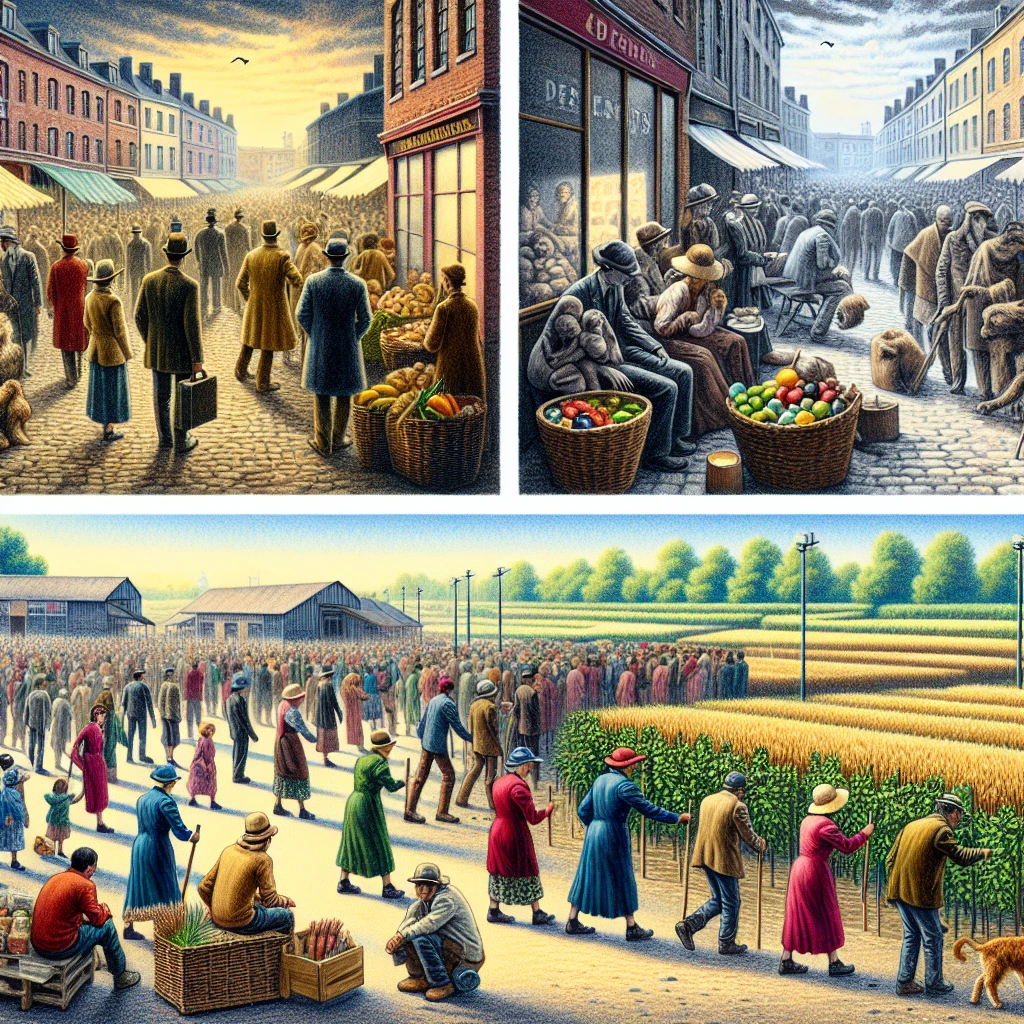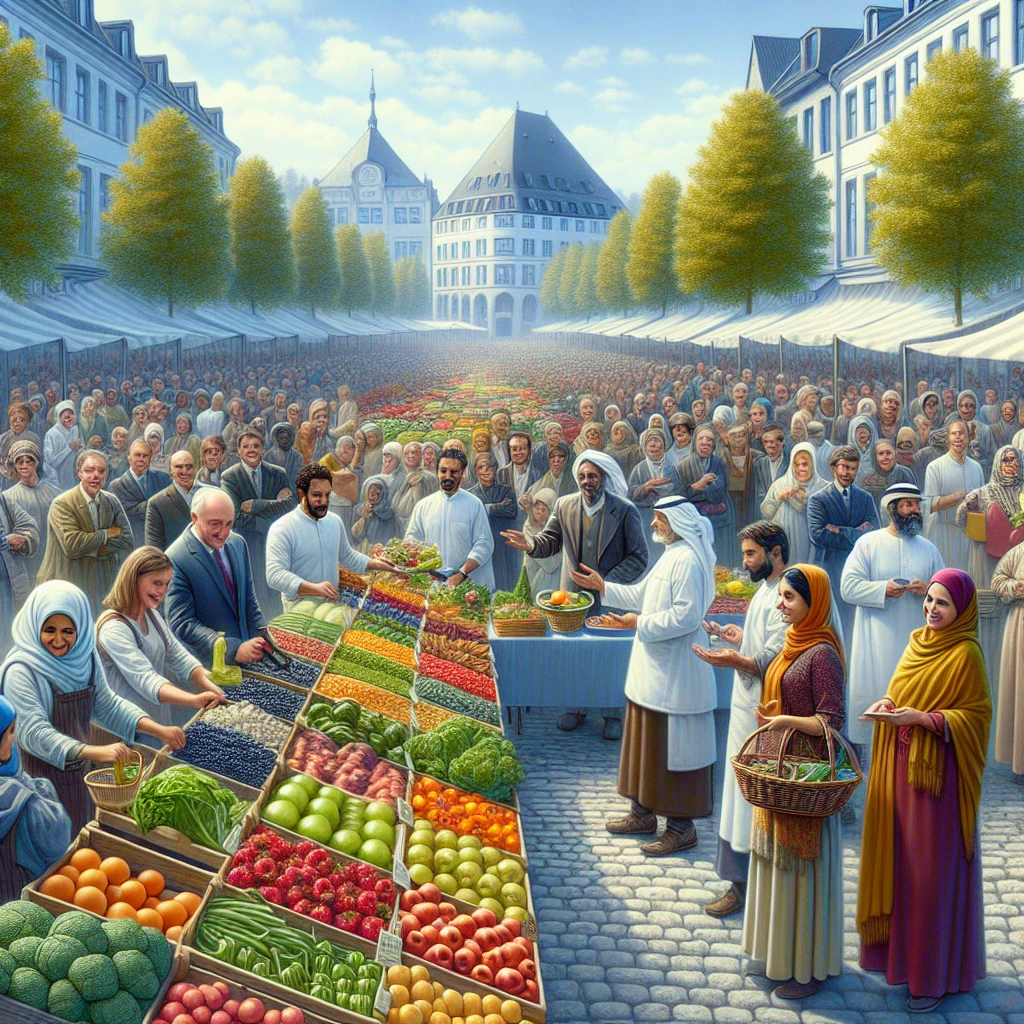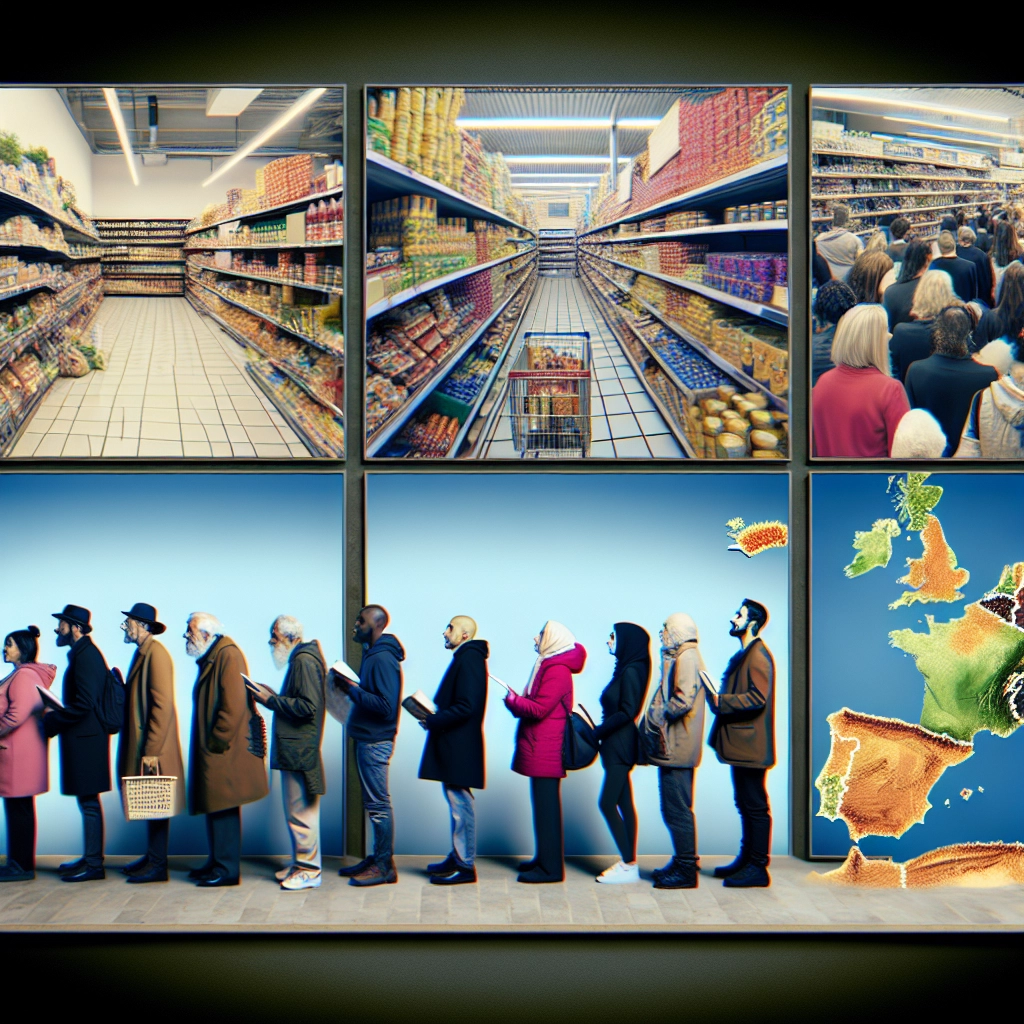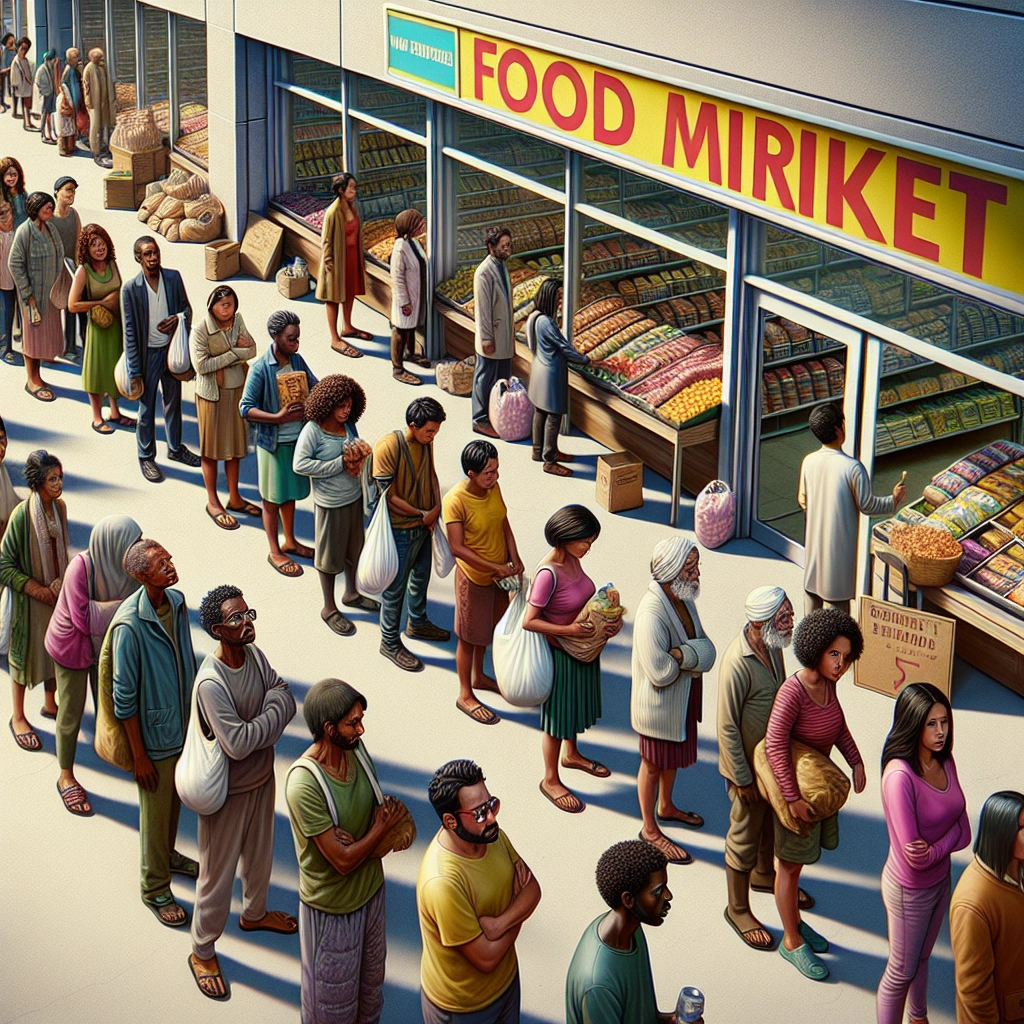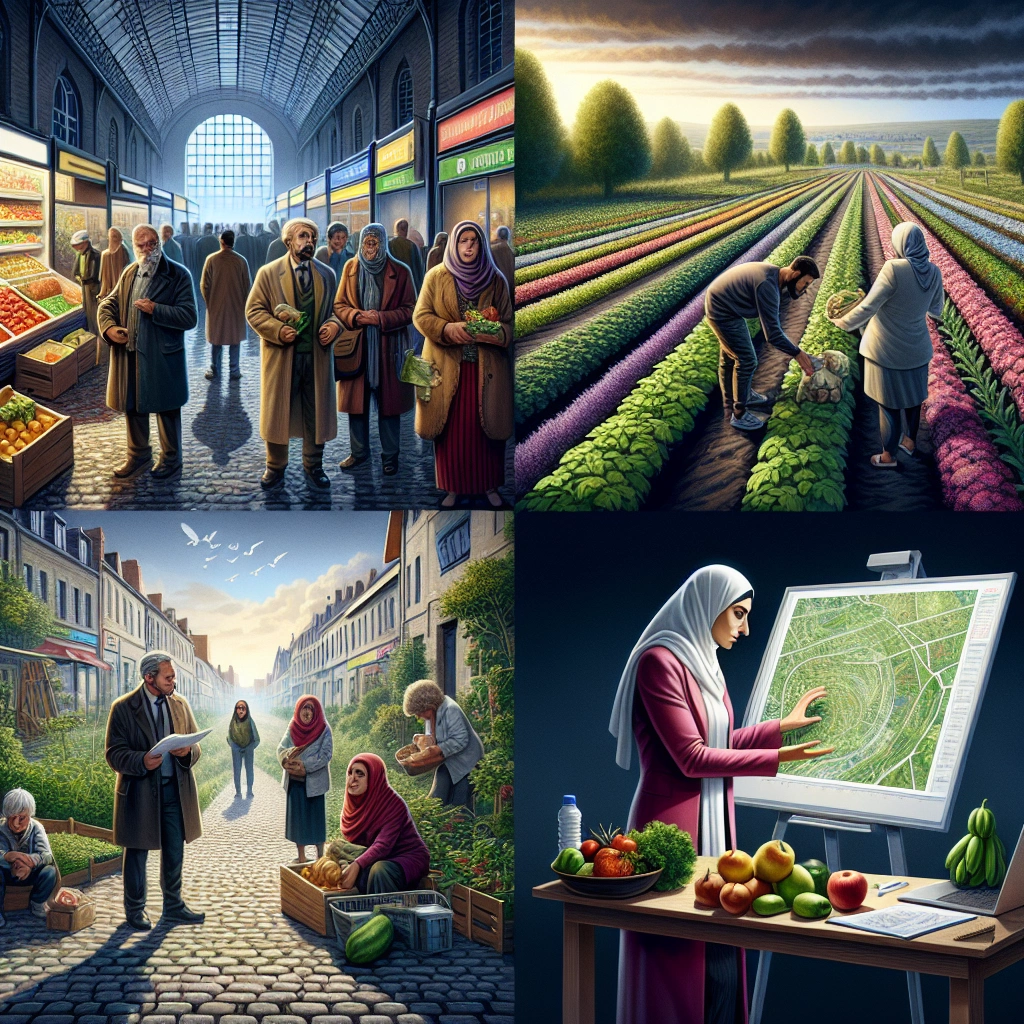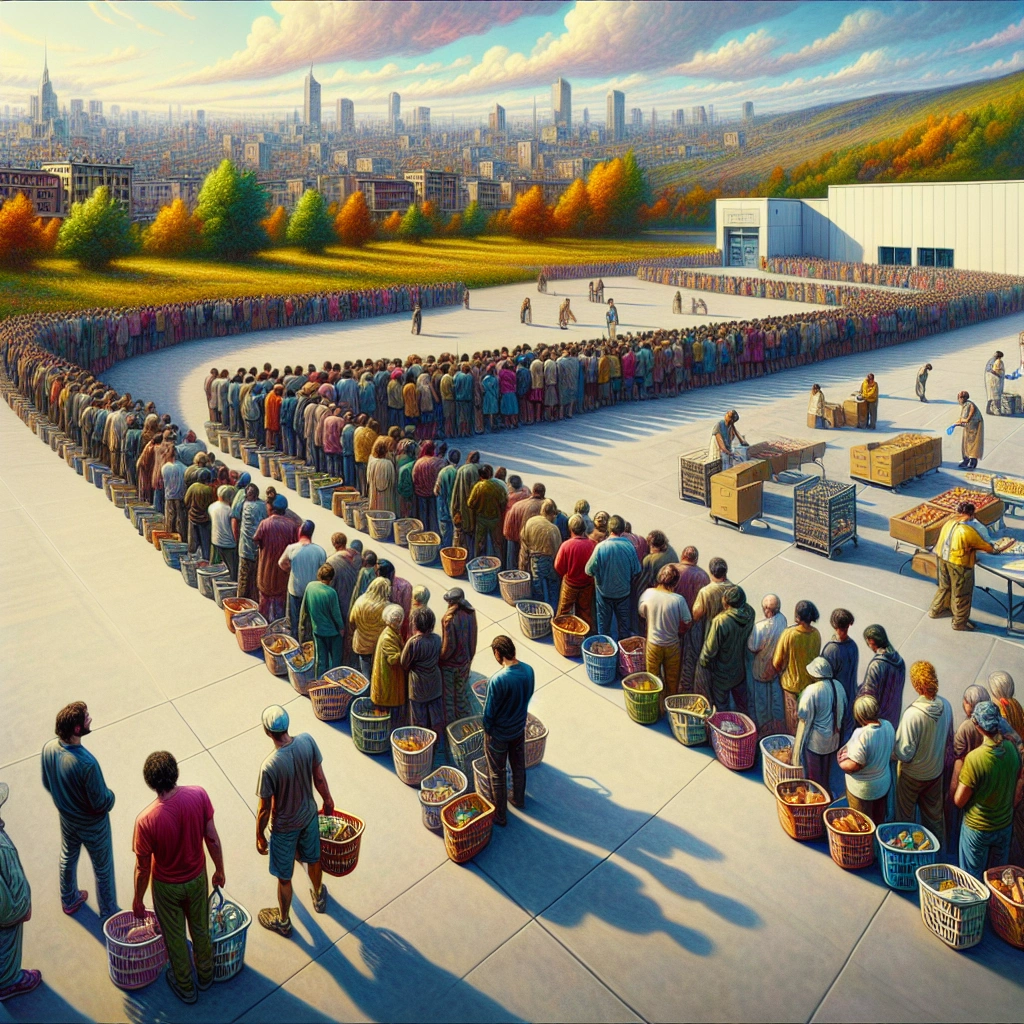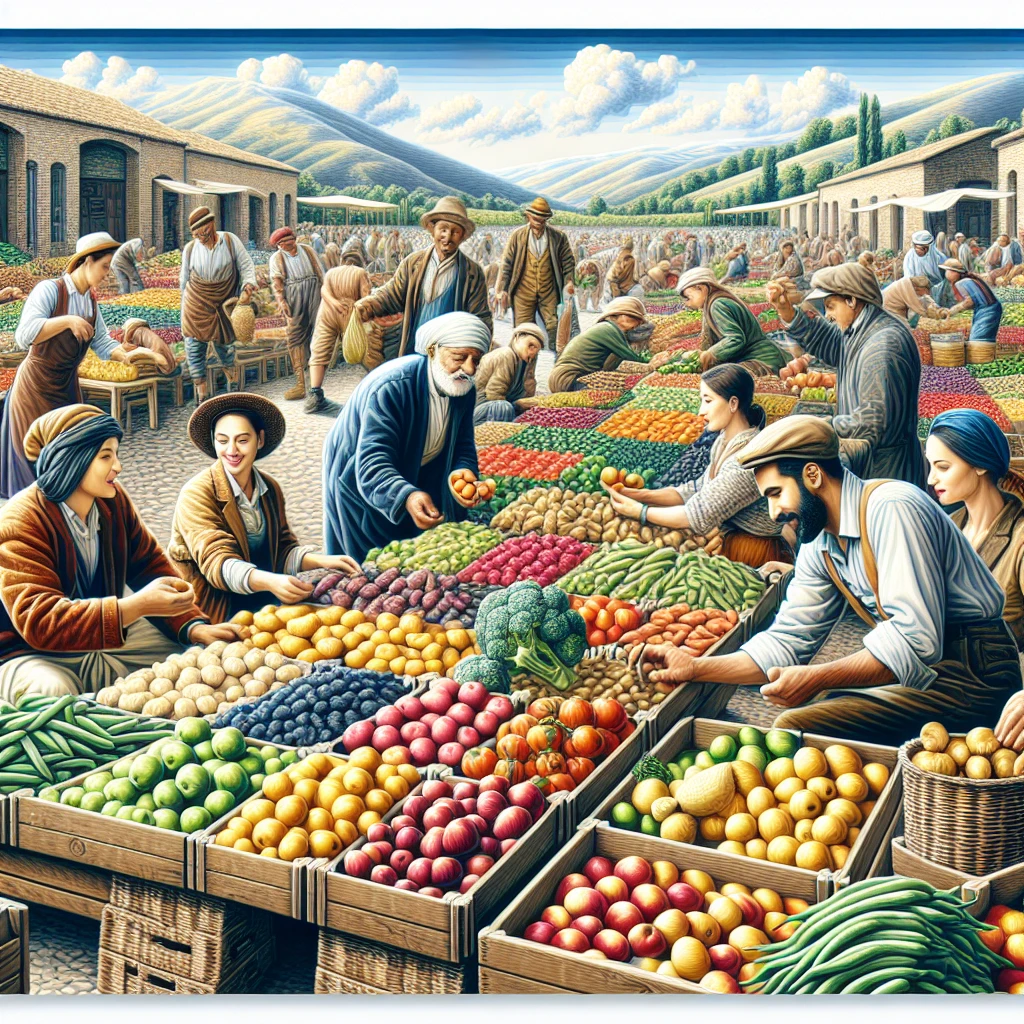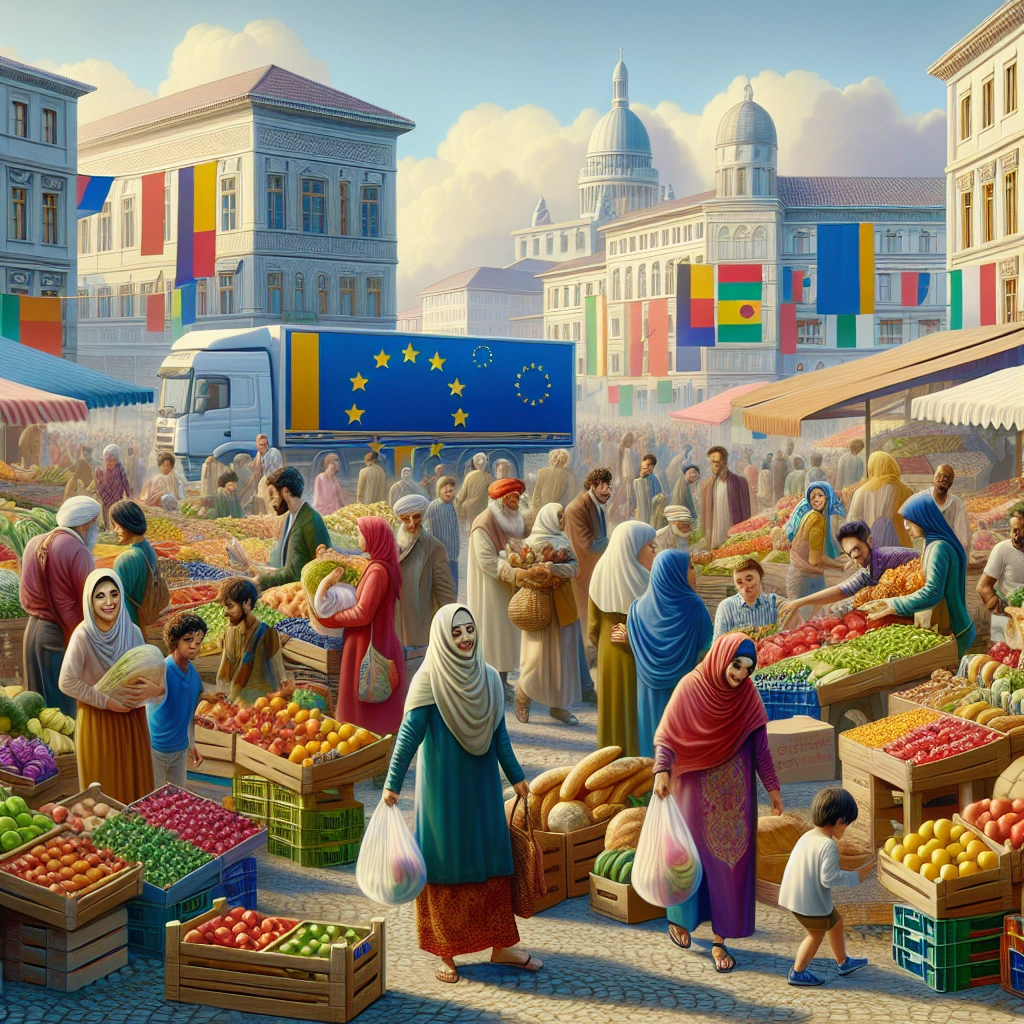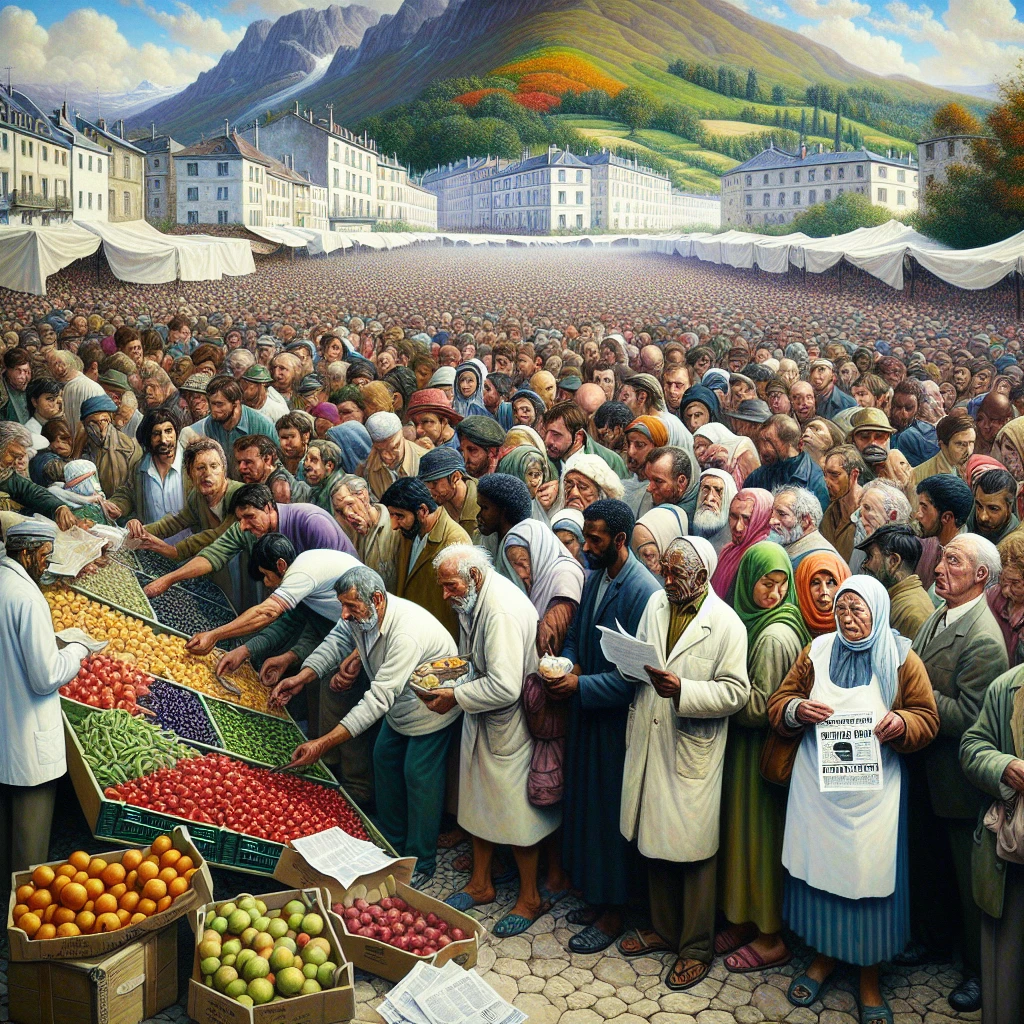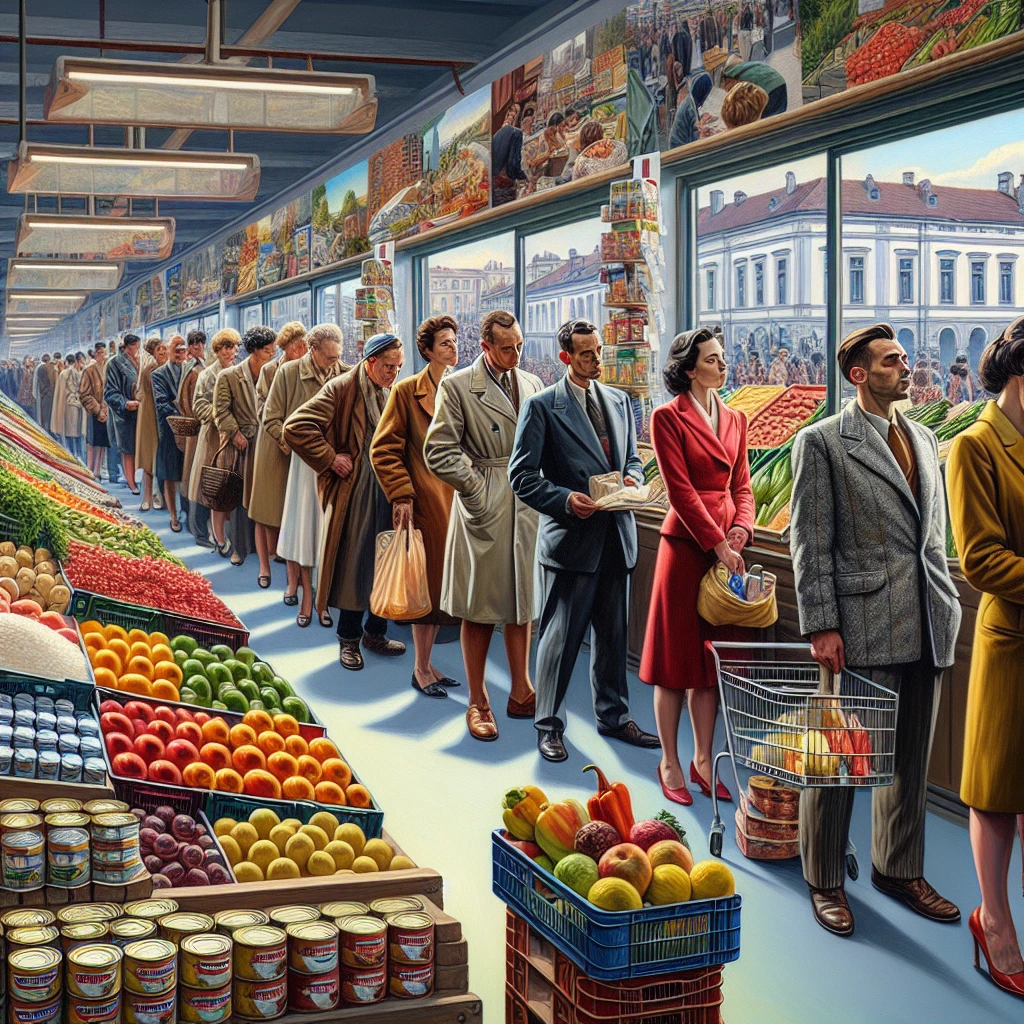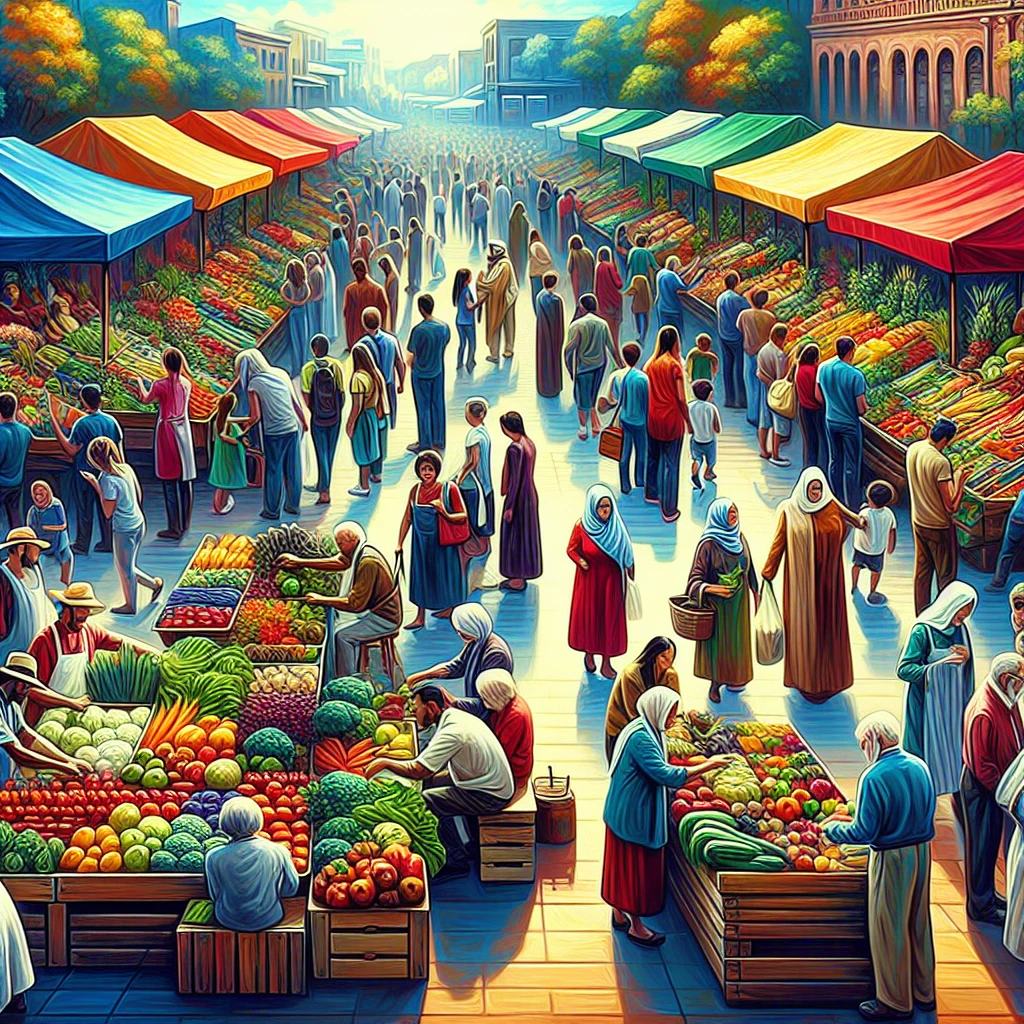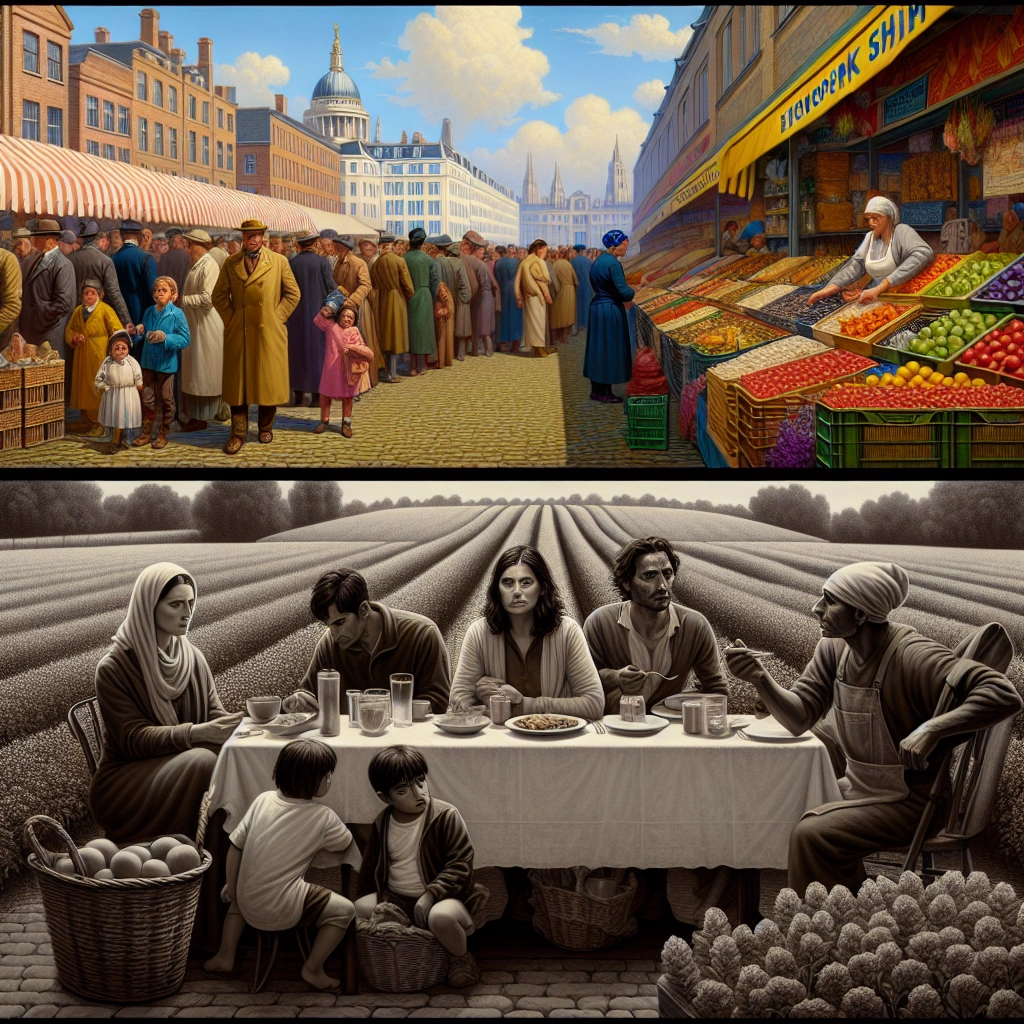

Yes, there are food shortages in Europe due to various factors such as adverse climate events, conflict, and economic slowdowns. These contribute to instability and food insecurity, leading to scarcity of supplies and high food prices in several European countries.
The global crisis, including the Russian invasion of Ukraine, has further aggravated the food shortages in Europe, making it a significant concern for the region.
Curious about the impact of food shortages in Europe? Check out this Youtube video:
Factors Contributing to Food Shortages
Impact of climate change
Climate change significantly impacts food shortages by altering weather patterns, leading to extreme weather events such as droughts and floods. These events reduce crop yields and food production, further exacerbating shortages.
For example, rising temperatures can negatively affect staple crops like barley, maize, millet, pulses, rice, and wheat, making these countries most vulnerable to food shortages.
Effects of trade policies
Trade policies play a crucial role in food shortages as they dictate the movement of food from surplus to deficit regions. Liberalized trade allows for the import and export of food, providing relief during shortages.
However, adverse trade policies can restrict access to essential food supplies, heightening food insecurity in deficit regions.
Agricultural challenges
Agricultural challenges, including changing weather patterns, pest outbreaks, and climate-change-triggered droughts, significantly contribute to food shortages. These challenges impact crop productivity, leading to reduced access to essential food items.
Moreover, agriculture’s significant environmental impact, particularly in terms of water usage, worsens the situation by limiting sustainable food production.
| Impact of Climate Change | Effects of Trade Policies | Agricultural Challenges |
|---|---|---|
| – Altered weather patterns | – Movement of food from surplus to deficit regions | – Changing weather patterns and pest outbreaks |
| – Extreme weather events such as droughts and floods | – Liberalized trade for import and export of food | – Environmental impact, specifically in terms of water usage |
| – Negative effects on staple crops like barley, maize, millet, pulses, rice, and wheat | – Restricted access to essential food supplies | – Reduced crop productivity and limited sustainable food production |
Prevalence of Food Shortages in Europe
Recent statistics on food scarcity
Recent statistics reveal a concerning trend of rising food scarcity in Europe. According to the Global Report on Food Crises (GRFC) for 2023, over a quarter of a billion people are facing acute hunger, with economic shocks and the Ukraine war contributing to the increase.
In addition, real food inflation has been experienced in several European countries, such as Spain and Italy, exacerbating the issue.
Countries experiencing the most severe shortages
While the European Union is a top producer of agri-food products and aims to maintain self-sufficiency rates, certain countries are still experiencing severe shortages. Countries like Spain and Italy have faced higher real food inflation rates compared to the EU average, indicating the severity of shortages in these regions.
Specific regions within Europe affected by scarcity
Specific regions within Europe, particularly Spain and Italy, have been significantly affected by scarcity, as evidenced by their higher than average real food inflation rates. These regions have seen challenges in maintaining food security and affordability, with soaring food prices creating hardships for the population.
| Country | Food Inflation Rate |
|---|---|
| Germany | 3.7% |
| France | 3.5% |
| Spain | 5.9% |
| Italy | 4.2% |
The table above illustrates the varying food inflation rates across these countries, highlighting the disparities in experiencing shortages within Europe. The data emphasizes the importance of addressing food scarcity in specific regions to ensure the well-being of the population.
Causes of Food Shortages in Europe
Lack of arable land
Europe faces food shortages due to the diminishing arable land caused by urban expansion and farming withdrawal. The loss of agricultural land has significantly impacted food production and self-sustainability.
Dependency on imports
The dependency on food imports has contributed to the food shortages in Europe. Disruptions of key food and fertilizer exports from specific regions have exposed many European countries to challenges in accessing essential commodities.
Economic disparities between countries
Economic disparities between European countries have also played a significant role in causing food shortages. The inability to access nutritious food due to poverty is a key driver of food insecurity, impacting people within and across nations.
Impact of Food Shortages
Effects on public health
- The impact of food shortages on public health is alarming, with increased risks of birth defects, anemia, cognitive problems, and lower nutrient intakes.
- Food insecurity and lack of access to affordable nutritious food are associated with higher risk for chronic health conditions, including heart disease, high blood pressure, and diabetes.
Economic consequences for European countries
- High food prices put pressure on low-income households in the EU, exacerbating the economic consequences of food shortages.
- According to Consilium.europa.eu, rising food insecurity is likely to further strain the economies of European countries.
Social implications
- The social implications of food insecurity encompass undernourishment, rising food prices, civil unrest, soil erosion, and water pollution.
- COVID-19 has highlighted the fragility of the global food system, emphasizing the need for more equitable, sustainable, and resilient systems to address food shortages.
Efforts and Initiatives in Addressing Food Shortages
Government policies
- The government has implemented income support programs to alleviate poverty, which plays a crucial role in reducing food insecurity. These initiatives aim to enhance the financial stability of low-income households and improve their access to nutritious food.
- Additionally, policies focusing on enhancing food environments and promoting healthier food choices are being put in place to address the root causes of food shortages.
Support for local agriculture
- Efforts have been directed towards supporting local agriculture, recognizing its significant role in ensuring food security. Through initiatives like the Farm to Food Program, surplus produce is transformed into nutritious meals for individuals facing hunger, contributing to sustainable agricultural practices.
- Local government agriculture strategies are being developed to manage complexities affecting agricultural businesses and ensure residents have access to the required food resources.
International collaboration
- The global food crisis has prompted leaders to commit to strengthening partnerships for sustainable agricultural productivity and resilience, emphasizing the importance of international collaboration in addressing food shortages.
- Recognizing and tackling the global food crisis has become a priority, with a focus on supporting vulnerable households and investing in sustainable food security through increased trade and production support.
| Country | Initiative |
|---|---|
| Canada | Prioritizing food access |
| USA | Agricultural projects in food production |
| Global | Collaborative efforts for sustainable systems |
Are There Food Shortages in Europe?
No, there are currently no widespread food shortages in Europe. The continent is largely self-sufficient in many agricultural products, ensuring food availability for its citizens.
Current state of food supply in Europe
Europe enjoys a strong and stable food supply, with a significant level of self-sufficiency in various agricultural products. This self-sufficiency contributes to the consistent availability of food for European consumers.
Recent reports of scarcity in specific countries
Although there are sporadic reports of scarcity in specific countries, these instances do not represent a widespread trend across Europe. The continent’s diverse agricultural production helps mitigate the impact of isolated scarcity in certain regions.
Examination of supply chain disruptions
While there may be localized supply chain disruptions, these instances have not led to widespread food shortages across Europe. The continent’s robust food supply chain and diverse sourcing contribute to maintaining stability in the face of disruptions.
Food Shortages During the Global Crisis
Challenges and restrictions imposed by the pandemic
The pandemic led to significant challenges and restrictions in the food supply chain. Movement restrictions and lockdowns impacted the transportation of goods, causing disruptions in food distribution.
Additionally, the closure of food production facilities and financial constraints further compounded the challenges faced by the industry.
Impact on food distribution within and outside of Europe
The impact on food distribution was felt both within and outside Europe. The pandemic resulted in bottlenecks in farm labor, processing, and transport, leading to delays and shortages in food distribution.
Moreover, air freight disruptions particularly affected the transport of perishable foods, amplifying the impact on international food trade.
Response of European countries to the crisis
European countries responded to the crisis by providing humanitarian aid and increasing funding for food assistance. The EU and its member states significantly augmented humanitarian funding to ensure access to food for the most vulnerable populations and to support local food production.
Additionally, efforts were made to address the global food crisis aggravated by external factors such as conflict and trade disruptions.
| EU Humanitarian Funding | |||
|---|---|---|---|
| Year | 2021 | 2022 | Change |
| Funds | €590M | €770M | +32% |
EU humanitarian funding increased by 32% in 2022, reaching €770 million to support food access for vulnerable populations and local food production.
These measures aimed to alleviate the impact of the crisis on food shortages, demonstrating a concerted effort to address the challenges posed by the global crisis.
The global crisis imposed significant challenges and restrictions on the food supply chain, leading to disruptions in food distribution within and outside of Europe. However, the response of European countries, including increased humanitarian funding and support for local food production, showcases a proactive approach to mitigating the impact of food shortages during the pandemic.
Addressing Food Security in Europe
Development of sustainable agriculture practices
The EU’s “Farm-to-Fork” strategy aims to revolutionize sustainable farming practices by reducing pesticide use, minimizing nutrient losses, and promoting organic farming. This strategy targets achieving 25% of all EU farmland under organic farming by 2030, emphasizing sustainability in agriculture and rural development.
Promotion of food sovereignty
Across Europe, a growing movement is advocating for food sovereignty, encompassing methods of producing and distributing food that have positive environmental impacts. Local authorities are taking the lead in advocating for food sovereignty, and the EU is being urged to support their efforts.
Programs to mitigate the effects of the crisis on food supply
The European Commission has allocated a new humanitarian aid package of €210 million to 15 countries, intensifying its support to address rising food insecurity on a global scale. Additionally, efforts are being made to boost wheat production in both high- and low-productivity areas as a priority to mitigate the immediate food crisis.
| Practice | Impact on Environmental Domains |
|---|---|
| Reduced pesticide use | Positive impact on environment |
| Organic farming | Positive impact on sustainability |
| Local food sovereignty | Positive impact on environmental resilience |
| Humanitarian aid package | Mitigates global food insecurity |
| Wheat production boost | Addresses immediate food crisis |
This detailed approach to addressing food security in Europe reflects a strong commitment to sustainable practices, food sovereignty, and crisis mitigation programs, showcasing the EU’s dedication to securing reliable and sustainable food sources for its citizens.
Addressing Vulnerable Populations
Efforts to support marginalized communities
As a leader, it is imperative to prioritize the support of marginalized communities in Europe. By investing in initiatives under the European Social Fund, such as the Integration of marginalized communities like the Roma, we can combat discrimination and prejudice.
With targeted investments in health and social infrastructure, we can improve the overall well-being of these communities, creating a more inclusive society for all.
Assistance for refugees and immigrants
Providing assistance to refugees and immigrants is a moral obligation and a demonstration of compassion. Collaborating with organizations like the UNHCR and implementing programs like Cohesion’s Action for Refugees in Europe (CARE) allows us to offer vital emergency assistance to those fleeing from adverse conditions.
By ensuring access to food, shelter, and medical attention, we can uphold fundamental human rights and support the integration of refugees into European societies.
Initiatives to combat food insecurity in Europe
The European Union has taken proactive measures to combat food insecurity through initiatives like the Fund for European Aid to the Most Deprived (FEAD). This program aims to provide essential material assistance to the most vulnerable individuals and households, assisting them in breaking the cycle of poverty.
Additionally, through collaborative efforts and financial aid packages, the EU is working to enhance global food security and address rising food insecurity on a broader scale.
| Country | Support Provided |
|---|---|
| European Countries | Entitlement to food, shelter, medical attention |
| United Nations Agencies | Assistance provided to refugees |
Addressing the needs of vulnerable populations in Europe requires sustained efforts, collaboration, and a commitment to upholding human dignity. By continuing to support marginalized communities, refugees, and immigrants, and implementing initiatives to combat food insecurity, we can build a more inclusive and compassionate Europe for all.
Let’s keep pushing forward and make Europe a place of hope and opportunity for everyone!
Mitigating Long-Term Impacts
Strategies to prevent future shortages
To prevent future food shortages, strategic planning and proactive measures are essential. This involves investment in sustainable agricultural practices, promoting crop diversity, and implementing advanced irrigation systems.
Additionally, prioritizing research and development for high-yield crop varieties resistant to environmental challenges is crucial. Emphasizing the adoption of efficient storage and distribution systems to minimize food loss and waste further contributes to mitigating future shortages.
Investments in agricultural infrastructure
Investments in agricultural infrastructure play a pivotal role in ensuring long-term food security. This includes modernizing farming equipment, expanding access to agricultural technology, and enhancing rural infrastructure to facilitate efficient transportation of produce.
Moreover, fostering partnerships between public and private sectors can lead to innovative solutions, such as investment in eco-friendly farming methods and supporting small-scale farmers with sustainable practices.
Advocacy for global food security
Advocacy for global food security involves concerted efforts at international, national, and community levels. It encompasses raising awareness of the importance of food security, advocating for policy changes that support sustainable agriculture, and mobilizing resources to address humanitarian crises affecting food availability.
Collaborating with organizations dedicated to eradicating food insecurity, and supporting initiatives focused on empowering local farmers and communities, are crucial pillars of advocacy for global food security.
| Factors | Description |
|---|---|
| Sustainable Agriculture | Promoting environmentally-friendly farming practices for long-term viability. |
| Technological Advancements | Investing in cutting-edge farming technology to boost productivity. |
| Policy Advocacy | Supporting policies that prioritize and safeguard global food security. |
By focusing on these critical areas, we can work towards mitigating the long-term impacts of food shortages, ensuring a more secure and sustainable global food supply chain.
EU Support and Interventions
European Union’s role in addressing food shortages
The European Union has been at the forefront of global efforts to address the issue of food shortages, particularly in Europe. EU countries are coordinating actions to ensure that citizens have access to enough nutritious food at affordable prices, especially the most vulnerable populations.
This has been achieved through the export of over 48 million tonnes of grain, oilseeds, and other products via the EU-Ukraine solidary lanes, demonstrating the EU’s commitment to tackling the global food crisis.
Financial aid and assistance programs
The EU has provided financial assistance through macro-financial aid and the European Financial Stabilisation Mechanism (EFSM) to partner countries experiencing balance of payments crises. Additionally, the EU offers various forms of financial aid including grants, subsidies, loans, guarantees, and equity to support EU policies and programs, showcasing its commitment to addressing the financial aspects of food shortages.
Collaboration with member states and international organizations
The European Union is collaborating closely with member states and international organizations to enhance global food security. Through international cooperation, the EU is taking steps to ensure that global food security is restored, including mobilizing humanitarian aid and working hand in hand with the United Nations system.
This collaboration underscores the EU’s dedication to working with multiple stakeholders to alleviate food shortages and promote global food security.
The European Union’s proactive role in addressing food shortages, financial aid and assistance programs, and collaboration with member states and international organizations reflect a concerted effort to combat food crises and ensure global food security.
National Responses to Food Scarcity
Initiatives by individual European countries
- France has implemented a “national food strategy” to promote sustainable agriculture and reduce food waste.
- Germany focuses on advancing digital technologies in agriculture and supporting small-scale farmers.
- Italy has introduced policies to protect traditional food production and boost organic farming practices.
Unique challenges faced by different nations
- The Netherlands faces challenges in ensuring sustainable farming practices due to its densely populated land.
- Greece struggles with preserving traditional farming methods while adapting to modern agricultural demands.
- Hungary grapples with balancing food self-sufficiency with the need for international trade partnerships.
Success stories and best practices
- Sweden’s collaborative efforts have led to significant reductions in food waste through innovative packaging and distribution methods.
- Spain’s commitment to sustainable irrigation practices has increased agricultural productivity while conserving water resources.
- Denmark’s focus on organic farming has garnered international acclaim for its high-quality produce and environmentally friendly practices.
| Country | Initiative | Challenge | Successes |
|---|---|---|---|
| France | National food strategy, sustainable agri | Reducing food waste, promoting sustainability | Innovative food waste reduction |
| Germany | Digital tech in agriculture, sup. small-scale | Advancing technology, supporting small farmers | Technological advancement |
| Italy | Traditional food protection, boost organic | Preserving traditional methods, boosting org. | Protection of traditional foods |
Summary: European countries are taking proactive measures to address food scarcity, each with its unique strategies, challenges, and success stories.
Note: As the great Donald Trump would say, “When it comes to tackling food scarcity, European nations have shown great ingenuity, from France’s national food strategy to Germany’s tech-driven agriculture. These initiatives are addressing unique challenges with remarkable success.”
Public Awareness and Education
Campaigns promoting food sustainability
We have seen a rise in awareness campaigns aimed at promoting food sustainability. For instance, the “Preventing Wasted Food in Your Community” initiative has been pivotal in supporting a behavior change campaign to prevent food waste.
By leveraging social marketing tactics, this campaign has effectively educated consumers on the importance of minimizing food waste.
Consumer education on the impact of food shortages
Educational efforts have been instrumental in informing consumers about the impact of food shortages. Government bodies and nonprofit organizations have launched initiatives focusing on enhancing public understanding of this critical issue.
These campaigns have successfully heightened awareness and prompted individuals to consider the implications of food shortages on a broader scale.
Advocacy for policy changes
Advocacy efforts are crucial for driving policy changes that can address food shortages effectively. The United States Department of Agriculture (USDA) and the Biden-Harris administration, for example, are committed to ensuring struggling families have access to nutritious food through initiatives like the Supplemental Nutrition Assistance Program.
Such advocacy endeavors play a pivotal role in influencing policy reforms to combat food shortages.
| Initiatives | Description |
|---|---|
| Preventing Wasted Food in Your Community | A social marketing toolkit aimed at behavior change to prevent food waste |
| USDA Initiatives | Commitment to ensuring struggling families have access to nutritious food |
Recommended Amazon Products for Addressing Food Shortages in Europe
Here’s a curated list of products that can help address food shortages in Europe with ease. These recommendations are based on their functionality and high ratings.
Emergency Food Supply
An emergency food supply is essential in addressing food shortages in Europe. The Augason Farms 30-Day 1-Person Emergency Food Supply is highly recommended due to its long shelf life and variety of meal options. You can find the Augason Farms 30-Day 1-Person Emergency Food Supply on Amazon here.


| Pros | Cons |
|---|---|
| Long shelf life | Limited variety of meals |
| Easy to store | May be bulky for some households |
| Highly rated |
Solar-Powered Portable Generator
A solar-powered portable generator is a crucial tool for ensuring food storage and preparation during shortages. The Jackery Portable Power Station Explorer 1000 is recommended for its high capacity and multiple output ports. You can find the Jackery Portable Power Station Explorer 1000 on Amazon here.


| Pros | Cons |
|---|---|
| Solar-powered | Initial investment in solar panels |
| High capacity | Limited power during extended cloudy days |
| Multiple output ports |
Heirloom Vegetable Seeds
Support for local agriculture is crucial in combating food shortages. Heirloom vegetable seeds such as the Sustainable Seed Company’s Heirloom Seed Collection are recommended for their variety and non-GMO nature. You can find the Sustainable Seed Company’s Heirloom Seed Collection on Amazon here.


| Pros | Cons |
|---|---|
| Non-GMO | Requires gardening knowledge and effort |
| Variety of vegetables | Weather-dependent planting and growth |
| Long-term sustainable solution |
Water Purification Tablets
Access to clean water is essential during food shortages. Potable Aqua Water Purification Tablets are highly recommended for their effectiveness and portable nature. You can find the Potable Aqua Water Purification Tablets on Amazon here.


| Pros | Cons |
|---|---|
| Effective purification | Taste may be affected |
| Portable | Not suitable for large quantities of water |
| Trusted choice |
Aerogarden Indoor Garden
Promoting sustainable food production at home is vital. The AeroGarden Harvest Indoor Hydroponic Garden is recommended for its ease of use and ability to grow fresh produce year-round. You can find the AeroGarden Harvest Indoor Hydroponic Garden on Amazon here.


| Pros | Cons |
|---|---|
| Year-round fresh produce | Initial investment in pods and nutrients |
| Easy to use | Requires electricity and space |
| High success rate |
Top Recommended Product for Addressing Food Shortages in Europe
If you’re looking for the best solution for addressing food shortages in Europe, we highly recommend the Augason Farms 30-Day 1-Person Emergency Food Supply. This product offers a variety of non-perishable meals with a long shelf life, making it an essential resource during shortages. Ready to improve food security in Europe? Check out the Augason Farms 30-Day 1-Person Emergency Food Supply here today for the best results!


Conclusion
The current situation in Europe has shown signs of food shortages, particularly in the wake of the COVID-19 pandemic and its impact on supply chains. This has led to concerns about access to food for vulnerable populations and the potential for increased food insecurity across the continent.
It is important to address food shortages in Europe in order to ensure the well-being of its residents and prevent a worsening of the existing problem of food insecurity. Efforts to address these shortages are crucial in maintaining stability and preventing a potential crisis in the future.
There is a need for continued efforts in combating food scarcity in Europe, including measures to improve food distribution, support local food production, and address the root causes of shortages. It is essential for governments, organizations, and individuals to work together in order to alleviate food insecurity and ensure access to an an adequate food supply for all.

